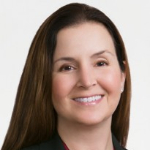In This Section

Rene LeBlanc-Allman
Partner, Chapman and Cutler LLP
Biography:
René LeBlanc-Allman is a partner in Chapman and Cutler LLP’s Banking and Financial Services Department and serves as the Office Leader of the firm’s Charlotte office. René had an integral role in the opening of Chapman’s Charlotte office in April 2017 and leads efforts to expand the firm’s commercial lending services throughout the region and network of female leadership.
René’s path into law was slightly circuitous. René joined the United States Air Force after finishing high school in Nova Scotia, Canada. While serving as a dental lab technician and field medic from 1987 through 1994, René availed herself of the military education programs and garnered her bachelor’s degree (magna cum laude) from the University of South Carolina. In tandem with her BA, she also became certified as a paralegal. Upon leaving the military, René worked as a paralegal for a small South Carolina law firm prior to attending and graduating (magna cum laude) from the University of South Carolina School of Law in 1999.
René’s practice involves the representation of the administrative agent or lender in a wide variety of syndicated and bilateral financings in middle-market and large-cap transactions and distressed credit facilities. René also assists corporate borrowers and financial sponsors in connection with their financing needs.
What advice would you offer to women just starting out in the industry?
Work hard, pay attention, avoid office drama, and find a mentor that you can relate to and trust. Practicing in finance is not easy, but it is dynamic and interesting. Be willing to work hard, learn everything that you can, but also raise your hand if you need something. Perhaps you are drowning in work or don’t have enough, would like some different work experience or need a break, or are having a problem with a colleague or staff. A mentor who is relatively senior within your organization can be an invaluable asset in these situations – he or she can help you navigate and get to a resolution. By paying attention to the office dynamics as well as learning your craft, you will quickly start building your own toolkit on how to handle different scenarios and issues.
What do you know now that you wish you knew in the beginning of your career?
I wish that I had realized that I could actually say “no” at times and had learned a little more about balance earlier in my career. I think many women, myself included, are programmed to want to try and be all things to all people to the point that we often exhaust ourselves. Exhaustion has many negative effects beyond the physical. You may suddenly find yourself not enjoying your job, you may feel as though you are neglecting your family, or any number of things. While it is important to find that certain committee or group that speaks to you, it is important to know that you can and should say “no” at times. Having a solid mentor can help you navigate to implementing a tactful “no” or slightly softer, “not at this time”.
What kind of role has mentoring and/or sponsorship played in your career?
I consider mentoring to be very important. While formal mentoring programs are great, I personally think that informal mentoring is equally, if not, more important. A mentor should be a senior individual that you aspire to emulate. My first mentor was also the leader of my finance group and he was fantastic (Don Lassiter). Don was a seasoned, well-respected lawyer who viewed me as part of his firm’s future. I could ask him to help me “prioritize” work requests when I was drowning, and he would provide guidance or intervene on my behalf. He provided teaching and advice both on legal substance as well as the firm politics, internal networking and firm dynamics. He was definitely my champion and I credit him for helping me feel included and truly part of the firm, which in turn motivated me along the path to partnership.
What do you think the industry could do to attract and retain the best and the brightest today?
The legal profession as a whole tends to have a negative cast about it, and students considering law school or a law firm typically know very little about transactional practice. I like to talk about how I really enjoy my profession. Every deal is different, which keeps my practice interesting. Another important facet is to try and retain work flexibility and set expectations. While “facetime” in the office is beneficial (you cannot just listen in on an unexpected negotiation if you are not in the office,) technology has become such that it is possible to be a very efficient and effective professional while working remotely. But there needs to be a balance.
Professional Development Courses
- Live online classes for ABL and Factoring professionals
- On Demand classes in Appraisals, Factoring, Legal, Workout & Bankruptcy
